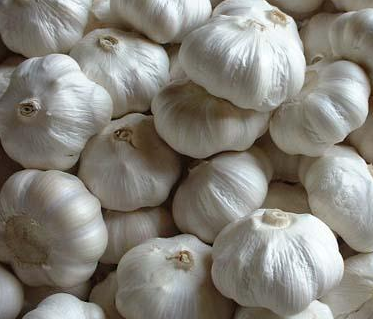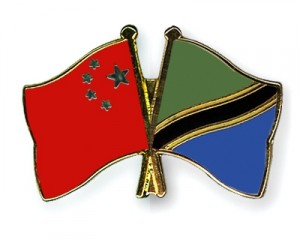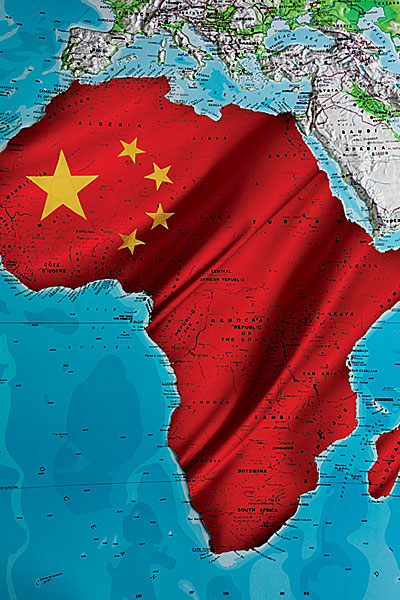A few days ago, I thought I would beat the morning rush and go grocery shopping at 7:30 a.m. in Dar-es-salaam’s busiest and largest market; Kariakoo. Shopping in Kariakoo is always an exciting experience, from the hustle and bustle to the loudness, the unbearable stench at times, and the pushing and shoving of people and foods alike.
As I walked from stall to stall, and saw the colours and kinds of the numerous fruits and vegetables my country grows, a sense of pride came over me. How many countries out there can grow all these varieties of foods? After spending eight years in North America, and having eaten imported fruits and vegetables especially in the winter months, I value countries that can be self-sufficient in that sense.
 “How much is garlic?” I asked the young man who was desperately trying to be my one-stop shop. After having bought onions, potatoes, lemons and okra from him, I wanted to buy garlic elsewhere but he wouldn’t let me.
“How much is garlic?” I asked the young man who was desperately trying to be my one-stop shop. After having bought onions, potatoes, lemons and okra from him, I wanted to buy garlic elsewhere but he wouldn’t let me.
“It depends which one; this one is 2200 shillings per kilo and this one is 1700,” he insisted. Confused I asked, what’s the difference between the two. One looked fuller, and lighter in colour, the others looked darker and smaller in size.
“These bigger ones are from China, they go for 1700, and these smaller ones are from here, they’re more expensive,” he explained. Being the patriotic person that I am, I paid for the Tanzanian garlic, but I slowly realized that the average person would rather spend less. After all, going to the market is all about bargaining and getting as much food with as little money.
I could not hide my emotions at this point. Why on earth is China importing garlic in Tanzania, a country that grows enough garlic for its market? And why is the Chinese garlic that much cheaper?
Now I know that Chinese goods are always cheaper no matter the country. But given their dominance in Africa, particularly eastern and southern Africa, I can’t help but wonder, what lies ahead for us? How do we expect our farmers who grow their crops in the hopes of selling them all so they can make a living to survive? How do we expect them to cope with this ridiculous competition with Chinese garlic?
And secondly, does our government not care about the advancement of our own farmers? Why don’t we have protectionist policies that ensure that Tanzanians get their own goods for cheaper, rather than allowing Chinese garlic to be sold cheaper than locally grown garlic?
This goes beyond garlic and cheap goods. The Chinese are building all kinds of buildings in Dar-es-salaam; I am certain that out of every five new buildings being built as I type this, at least three of them have some kind of Chinese involvement. Yet within a few years of construction, we see these same buildings falling apart. And then there’s the issue of road construction. While we appreciate all these new roads, there have been many complaints of fast and poor construction. Yes, the Chinese work hard and fast, but unfortunately, the quality is often poor, and these complaints are heard all around.
There are many short-term benefits from China’s presence in Tanzania and ultimately Africa; we are getting buildings, hospitals and roads built, we are getting cheaper food in our markets, and when it comes to cheap electronics, China’s clearly leading the way.
But I ask, what about the long-term impact of all these benefits? Who will be there to renovate these roads when they start to wear down, which they already are? Who will be there to reconstruct these buildings that are falling apart quicker than the speed of light? And most of all, who is going to be feeding our farmers who are losing out to Chinese competition?
I may sound like a hypocrite, because after all, I’m enjoying our Chinese-built roads and hospitals and so forth, but I think as Tanzanians and Africans, we ultimately need to stop and think… where are we going to end up down the line? When China has taken enough natural resources, when China is done with Africa, what will Africa do then?



We should definitely stop and think, but one question I ask, what are our alternatives? And are these alternatives really practical? And if so, who exactly will benefit from them?
Let alone garlic, in most African states rice and cotton imported from the US is outcompeting local rice/cotton and threatening the livelihood of the native farmers. A good documentary that goes into such harmful practises is The Cotton War (bofya).
Last time niliingia kariakoo shimoni nikakutana na wachina. Ukipita mitaa ya Kongo kwenye mitumba wachina wamo…mhhh…jamaa wako kila kona..yah..hapa serikali inaweza kuangalia utaratibu wa work permit and protecting local farmers and businesses from such imports…
I mean why would chinese people be allowed to sell ‘mitumba‘ while there is countless number of ‘machingas’ doing the same thing….It dont know the details and agreements between the governments….but the government should [get] more into it…..
I have same question as Jofu.. what are the alternatives? when tanzanians cant build their nation then let someone else come and do it for you. Today chinese are going everywhere even in places like afghanistan! i am just amazed by their aggressiveness.. and i guess there is a lot to learn from them.. in terms of how to do business..which unfortunately our govt doesnt. I support open market but may be the govt should come up with better policies that benefit both.. imean something that would allow foreign investment but at the same time increase the number of jobs for tanzanians…
but until we get some sensible people in power.. i say let them build stuff for us.. at least we will have some infrastructure in the country. those are just my two shillings:).
That’s a huge price difference in the garlic. I’m guessing the small dark ones were from Tz. They tend to be tastier – moist with a rich flavour. Save your fingers and get the ready peeled ones
It puts one in mind of agriculture interventions in Tanzania now and in the past. The stress has always been on production: research centres, seeds, tractors. And too often that involves inefficient rent seeking government agencies – most recently, the army, in the case of the tractors and power tillers.
This supply side bias isn’t going to work in competitive global markets where someone is making a buck on Chinese garlic in Kariakoo. Make stuff that people want to buy at a price they like. start from there, not the other end.
Bata is right to point a finger at misdeeds in uhamiaji for giving people permits to do business. But nobody gives you a permit that makes you good at business. That’s something we need to work on.
karibuni wachina, watanzania hatuwezi ushindani, njooni labda mkileta ushindani utatuamsha katika usingizi wetu wa uvivu na ukosefu wa ubunifu.
Hii inatisha, hivi Serikali hawaoni kuwa hili ni tatizo ambalo linajijenga taratibu litakalo leta matatizo makubwa hivi karibuni. Sasa kama waChina wameanza kukamata hata biashara ndogo ndogo ambazo zinawapa vijana wengi kipato, hao vijana watakimbilia wapi?
Mimi ninaanza kuwa na wasiwasi kuwa, kutatokea fujo kariakoo siku moja kati ya waChina na wachuuzi, manake hii sasa kweli ni “a little too much”.
Sema sasa kwa upande mwingine, kwakuwa bidhaa zao nyingi ni bei rahisi, hatuoni kama hilo linasaidia wengi ambao ni watu wa kipato cha chini. I guess wanajenga na kubomoa..Ooh Wachina hawa..Sema wasiwasi wangu mkuu ni huu, bidhaa zao kwa mara nyingi zimelalamikiwa kwa kuwa na ubora wa chini, hata kuweza kuhatarisha afya za watumiaji.
Mimi nadhani Wachina wabanwe, na bidhaa zao zichunguzwe kwa kina kuhakikisha wahatuuzi sumu. Serikali wamelalia hili swala, mpaka watu wadhurike. Mimi nina wasiwasi sana na Wachina, kwani wao wana mentality ya by any means necessary, hata kama ni ku-compromise other peoples health, just to get ahead..watu wenye mentality hiyo, ogopa. Tanzania kaeni chonjo..ukoloni mamboleo, nadhani tumeimba neo colonialism for a while now, nadhani the tune will change na kuanza once again kuimba colonialism…
Mimi napenda nianze kwa kuwa kinyume kabisa na mwandishi. Kuna baadhi ya maeneo naweza kukubaliana nawe, lakini mengi nitapingana na wewe na wengine kama ifuatavyo:
1. Wachina ni hard working, fine… na hii ni changamoto kabisa kwa hako kanchi ka wananchi wake wasiotaka haraka kuanzia maofisini hadi kila sehemu. Sasa wanakuja kufanya kila kazi, hilo tunaliona lakini Mtanzania bado hataki kubadilika. Jamani, mnataka mbadilishwe mpaka na nani??
Kazi kulaumu tu kila siku, ooh viongozi; ooh mafisadi. Wakati sisi wenyewe ni wazembe wa kutupwa?
2. Kama hujawaahi kwenda China basi sitakushaangaa sana kuwalaumu kiasi hicho Wachina, lakini ukweli ni kwamba, ukifika maeneo kama ya Guanzhou ndio utaamini kuwa Afrika imehamia China. Yaani kule ni kila dakika moja ni mweusi… Mbona Muafrika yuko kila sehemu mbaona hamsemi? Kisa Mchina?
Unatoka North Amerika najua ni jinsi gani unavyojua mwingiliano wa mataifa mbalimbali. Lakini nashangaa unapowakandia Wachina; kisa kasumba ya Western countries ya kuwachukia Wachina. Hii ni kweli maana Westerners sasa wameshakosa ushawishi katika Afrika hivyo hawana budi kuipinga China kwa njia yeyote ile, na wewe je???
3. China ni taifa lililotawaliwa kama Afrika hivyo Wachina wanajua nini maana ya ukoloni. Hivyo kwa mtoa maoni Bahati M, kuhusu ukoloni mamboleo kwa Wachina siwezi kukukubalia [nawe] hata siku moja. Hiyo unaongea tu kwa kutumia mawazo au hisia tu kwamba itakuwa hivyo. Ila ukweli ni kwamba rafiki wa kweli wa Afrika ni China pekee yake, wala hakuna nchi yeyote nyingine.
4. Tumezoea conditionality na businesses zinazofanywa na asasi za kimataifa kama IMF, WB, nchi wahisani etc. Kama utafuatilia, utagundua kuwa hakuna chochote wanachosaidia Afrika zaidi ya kuzidi kulinyonya bara letu tu. Mfano, wanakukopesha pesa mwisho wa siku unalipa deni mara mbili au mara tatu yake. Je, unamsaidiaje masikini kwa kutaka faida maradufu kiasi hicho? Hilo hamlioni; mnaona tu wachina ndio tatizo?
5. Hivi hao mabwanyenye walitujengea nini cha maana? Wakitoa pesa zinaishia mifukoni kwa mafisadi, wala haziwafikii wananchi walengwa. Lakini Wachina wakija wanakujengea barabara, majengo [ya] shule, hospitals etc., bila masharti yeyote. Wananchi wanaona kwa macho kuwa nini wamefanya. Je, hawa ni wabaya kweli? Sasa wewe unataka nini zaidi? Kama huwezi hata kujenga shule, hospitali, barabara etc. mwenyewe na unajengewa, bado unalalamika na kudharau na kuwabeza kisa mawazo ya kule Ulaya na Marekani..ohh Wachina ..ohh!
6. Watanzania lazima tufikie mahali tubadilike sio watu wa kulaumu kila kitu; kama hatuwezi kufanya vitu basi hatuna budi kuwaacha hao wanaoweza watufanyie au wafanye, maana hata kama tutawakataza na uhakika kale ka nchi ketu hata haya majengo marefu na mazuri yanayojengwa yangekuwa ni ndoto tu. Tuachane na itikadi za chuki za nchi za magharibi. Tupime wenyewe kipi ni kizuri na kipi ni kibaya; sio kulaumu kila kitu.
7. Sikatai kuwa “nothing goes with nothing” lakini nadhani ni bora kwa hao Wachina wakafaidikika kuliko hayo mabepari waliokaa nasi miaka nenda rudi wala hawakutaka tubadilike. Na siku zote wanafurahi sana kukuona ukiendelea kuwa ombaomba kwao.
8. Nakukumbusha, je wajua chanzo cha Nyerere na Kaunda kwenda China kuomba kujengewa Reli ya Tazara?
Walikwenda Marekani, na nchi zingine za Ulaya kuomba msaada wajengewe hiyo reli ili kukuza biashara baina ya nchi za kusini mwa Afrika. Lakini walikataa na kusema kuwa nchi zetu kwa sasa hazihitaji huduma hiyo kwani ni gharama sana. Unaona hayo majibu? Je, hao watu wanakutakia mema?
Ndio Baba wa Taifa na Kaunda walipokwenda kumuomba Chairman Mao wa China na hapo hapo China walikubali kujenga TAZARA kwa mkopo usiokuwa nafaida, na mwaka jana wamelifuta deni lote kabisa, maana yake imekuwa kama walijenga bure.
Hao watu bado tunawadharau na kuwaona hawafai kila siku utasikia dhihaka nyingi tu kwa Wachina. Reli tumejengewa bure leo hata kuiendesha tumeshindwa. Badala ya kuona matatizo tuliyonayo bado tunalaumu Wachina badala ya kujilaumu ssisi wenyewe.
9. Nakubali kuwa kuna vitu vya China vinakuwa na ubora wa chini. Lakini tutafakari na kufikiri, je chanzo ni nini? Je, ni Wachina au sisi wenyewe? Namaanisha wafanya biashara.
Ukifika China utajua ninachookueleza, ni kwamba China ni nchi ambayo bado inaendelea ingawa uchumi wake kwa sasa unatisha na miji yake mikubwa huwezi ukatiofautisha na nchi za magharibi. Lakini bado ni nchi inayoendelea, hivyo basi, bado kuna matabaka mengi ya matajiri sana na masikini pia. Huku kila kitu kinatengenezwa kwa matabaka mbalimbali ili walau kila tabaka liweze kufaidi product za nchi yake. Kwa mfano, kama Nokia E71 utakuta ipo genuine (original), wakati huo huo ipo iliyotengenezwa ikiwa na function zile zile ila sio original (feki). Na unapotaka kununua watakuuliza unataka ipi? Original au feki? Siku zote huwa wako honest kabisa wala hawatakudanganya. Ila kinachofanyika ni kwa wafanya biashara wetu wanapenda kununua hivyo vya feki hali wakijua hali halisi kuwa ni feki ili wapate faida maradufu. Na wanafanya hivyo kwa makusudi kabisa.
Nani wa kulaumiwa? Wewe mwenyewe au Mchina? Yeye katengeneza kwa matumizi yake ili hata mwenye kipato cha chini basi walau aonekane anacho ingawa ni feki. Serikari inatakiwa kuwabana hawa wafanyakazi ili waingize bidhaa bora.
[Edited – Kupangilia vizuri tu. Sijapunguza wala kuongeza lolote, Dr. Mallaba – SN]
Well said Dr. Mallaba! agree with pretty much all your points. corruption, poverty, colonialism bla bla.. many countries are facing same challenges.. tanzania is not alone! and also Africa is not alone! Just the other day it was on bbc..
“‘More poor’ in India than Africa- Eight Indian states account for more poor people than in the 26 poorest African countries combined”
despite of all the poverty, all the corruption, AIDS etc etc indians are coming up.. same goes with Chinese.. there got to be something in that part of the world which we dont..and until we figure that let them come and build my home!
kwanini tunadanganyika na misaada midogo midogo kutoka nje. sidhani kama tuafika watanzania kwa hali kama hii inayoendelea sasa. mfumo wetu wa elimu ni mbovu kuliko mifumo ya nchi nyingine zote. waandisi wanaozalishwa na vyuo vyetu hawapati nafasi ya kuonyesha ujuzi wao kwa sababu ya uvamizi kutoka china na nchi za magharibi. hivi tutafika?